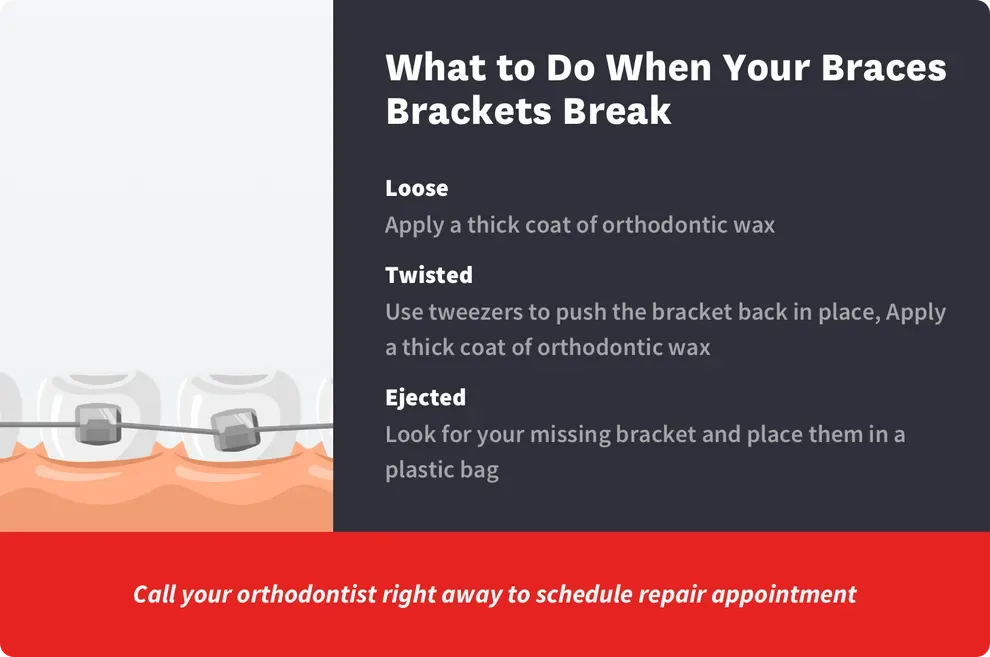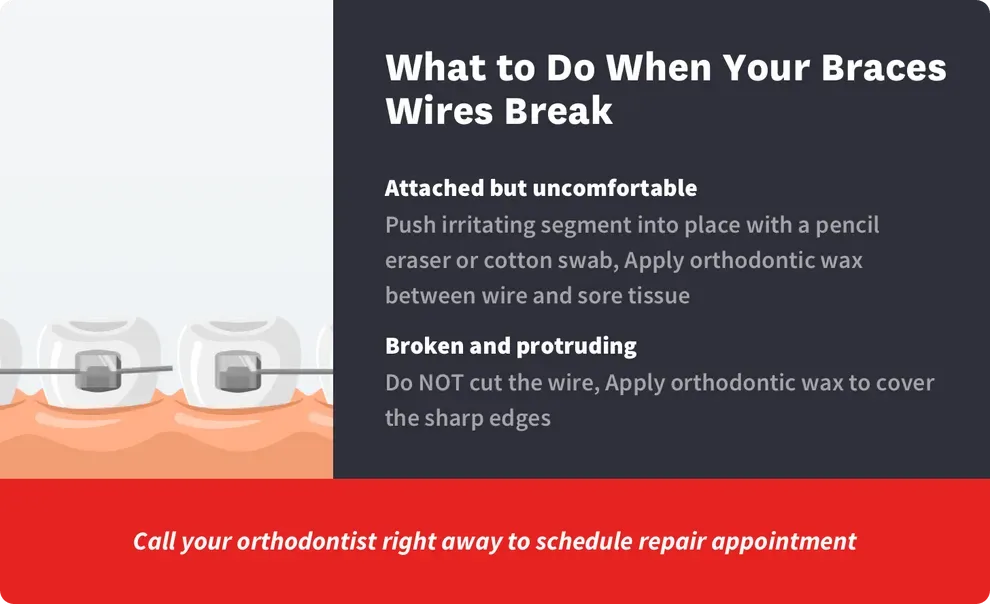What to Do When Braces Break

Table of Contents
- When Brackets Break
- When Wires Break
- Preventing Breakage
- Other Options to Consider
You were eating something sticky. Or you were brushing just a little too hard. Or you decided to skip your mouthguard while you played basketball. No matter the choices you made, the results were the same. You broke your braces.
Whenever something happens to your braces, you should call your doctor for advice. But a few quick-thinking steps on your part could help to limit the damage and help your treatment plan stay on track.
What to Do When Brackets Break
Your teeth are connected by wires, and each one of your teeth has a small bracket that holds the wire. In a perfect world, you'll have the same set of brackets throughout your entire treatment plan. But unfortunately, breaks are common.
Some teeth just don't seem designed for brackets. Researchers say, for example, that premolars and bracket failure often go hand in hand. Some types of brackets, including those made of ceramic, rub against one another, and the friction can cause failure.
Even though it's common for brackets to break, it's unfortunate. When it happens, you must take action. Take some quick action if your bracket is:
Loose. If the device is still somewhat attached to your tooth but you can feel it wiggle and wobble, apply a thick coat of orthodontic wax. The substance will keep your wire in place until you can see your doctor.
Twisted. If your bracket comes loose from your tooth, it may rotate on the wire and poke your tongue and gums. Use tweezers to push the bracket back in place, and apply a thick coat of orthodontic wax over the top.
Ejected. If you've been hit in the head or mouth, your brackets may come loose and the wire may break. Look for your missing brackets, and place them in a plastic bag. Your dentist may want to see them before repairing the damage.
Remember that all of the solutions we've outlined here are temporary. If your brackets break, your orthodontist must get involved and help you.

What to Do When Wires Break
It's somewhat rare for the metal pieces connecting your brackets to break or snap. But wires can twist or shift, especially when you're hit in the face or head.
If your wires are:
Attached but uncomfortable. Determine where the wire is poking your mouth. Attempt to push the irritating segment into place with a pencil eraser or cotton swab. If you can't, apply orthodontic wax between the wire and the sore tissues.
Broken and protruding. Don't use pliers or any other tool to snip off the edges. You could swallow the tiny pieces, and that could cause internal damage. Instead, use wax to cover the sharp edges.
Call your orthodontist right away and report what's broken. You'll need an appointment to repair the damage.

You should always call your orthodontist when your braces break because simple at-home care can help you avoid injury while waiting for a repair appointment.
How to Prevent Breakage
Researchers say breakage isn't associated with a longer treatment time. As long as you work with your doctor, you can get back on track and move toward the smile you always wanted.
But heading to the orthodontist for a repair is a hassle. And snipped wires and missing metal bits can hurt the sensitive tissues inside your mouth. It's best to prevent problems when you can.
After your braces break, think about how it happened. Was it caused by:
If your teeth hurt, you might be tempted to poke and prod at the hardware with toothpicks and other devices. Instead of trying to ease the pain at home, ask your doctor for help. You might need a wire adjustment or more wax.
Researchers say braces make eating challenging. Most people restrict their bite sizes, yet they find it's uncomfortable or even embarrassing to eat. If you've broken the rules just once and snacked on foods that are hard, sticky, or crunchy, learn from your mistakes and avoid those foods in the future.
Some facial blows are avoidable. Helmets and mouth guards can protect your braces while you're on the go. And skipping some activities like boxing might be smart.
Some people use too much power while they brush and floss. If you didn't change your ways when you got your braces, you could harm your braces in an effort to keep your teeth clean. Switch to a soft-bristled brush and ask your dentist to show you how to hold it to apply less force.
Remember that you won't wear your braces forever. The changes you make now are temporary, and when you have the smile you want, you can go back to your regular habits. But taking steps now can help you avoid emergency visits.
Other Options to Consider
Braces can be effective, but when they break, they can cause both hassle and pain. You have other tooth straightening options that can handle the work while causing you fewer problems.
Clear aligners slide over your teeth, and they apply gentle pressure that shifts the teeth to new positions. Researchers say teeth aligners are less painful than braces. They also don't consist of metal bits that can poke and rip up your mouth.
